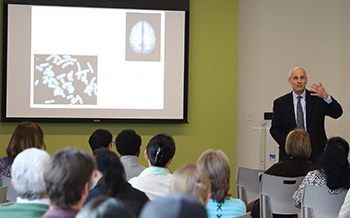
Dr. Scott Zeger, John C. Malone professor of biostatistics and medicine and former chair of the Department of Biostatistics at Johns Hopkins Bloomberg School of Public Health was the inaugural speaker for the College’s new Dean’s Seminar Series.
The United States has the highest health care spending per capita ($1 trillion more than the next highest), and we’re not healthier. Dr. Scott Zeger calls this the “big datum problem with the U.S. Public’s Health.”
Zeger, John C. Malone professor of biostatistics and medicine and former chair of the Department of Biostatistics at Johns Hopkins Bloomberg School of Public Health was the inaugural speaker for the College’s new Dean’s Seminar Series. The series is made possible by a generous gift from an anonymous donor.
Zeger opened his comments by promising to challenge the audience – as faculty and students of an emerging college of public health – because, he said, “this is a unique time and our society depends on you.”
“The unpleasant truth is that we’re spending more on health care and not getting health,” explains Zeger. But, what can we do about it, and specifically, what can public health and medical professionals do about it (in addition to voting)?
First, Zeger said, we must consider what causes this overspending. A larger part of it is due to waste, such as failures of care delivery, failures of care coordination, and overtreatment, which are themselves based on bad decisions. This type of overspending does not improve care, so reducing spending on waste should therefore be prioritized over other actions such as changing benefit structures, payment levels, or eligibility.
This is where Zeger recommends public health and medical professionals work together to bring down the cost of health care. By comparing what we know about an individual to what we know about a population, we can help health care providers make smarter decisions that reduce waste without a negative effect on health.
They can also work together to build systems that integrate practice, data, and knowledge for better decision-making. Additional changes also must be made, such as creating a new public health business model that financially rewards health—not ineffective health care services.
Zeger shared an example of public health and the medical system working together for better decision-making for treating prostate cancer. Zeger and colleagues found that prostate removal was commonly recommended to patients with prostate tumors, with serious consequences (impotence, incontinence), and that aggressive cancerous tumors were rare and slow growing. They developed a Bayesian hierarchical model—a multi-level statistical model that accounts for uncertainty in the data—to help predict which patients would be more likely to develop an aggressive cancer and therefore be important candidates for prostate removal (vs. irradiation or monitoring). The Precision Medicine Analytics Platform (PMAP) uses this model and presents data from a variety of sources to clinicians in a user-friendly treatment platform, which helps them and their patients make better decisions about treatment.
The Precision Medicine Analytics Platform (PMAP)
Zeger encourages similar work integrating population and individual-level data for clinical decisions. He calls for public health professionals to take responsibility for the success of the health care system and to work with medical professionals to incorporate population-level data in their decision-making.
Zeger likened changing the health system to changing the engine of a 777 while flying over the Atlantic. “We have to bring what we do into alignment with what we think,” he explains. “If you wait around for the medical system to change, it’s going to happen later than it needs to.”
A full video recording is available of Zeger’s presentation for the Dean’s Seminar Series. View the video recording here.
